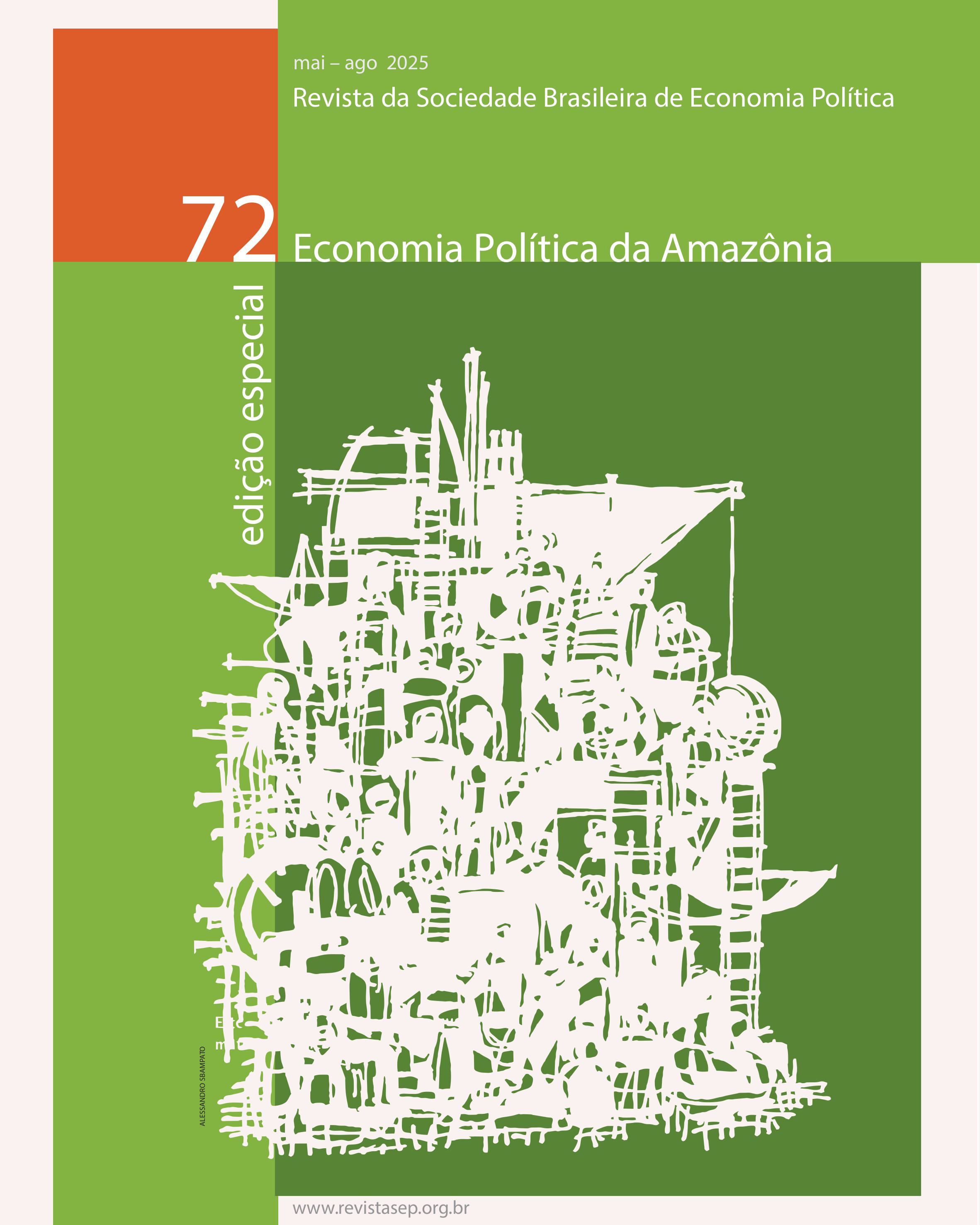Quando o dom se torna mercadoria fictícia:
uma análise da mercadorização da Amazônia à luz de Polanyi e Francisco
DOI:
https://doi.org/10.69585/2595-6892.2025.1264Keywords:
Amazônia, mercadoria fictícia, Papa Francisco, PolanyiAbstract
This article analyzes the commodification of the Amazon by connecting the ideas of Karl Polanyi and Pope Francis. Though from distinct traditions—Polanyi's critique of the self-regulating market and Francis’s Catholic Social Teaching—both converge in denouncing the commodification of life and defending ethical and ecological limits to capitalist logic. Based on the concept of fictitious commodity and papal documents such as Laudato Si’, Fratelli Tutti, Laudate Deum, and Querida Amazonia, the article discusses how the forest, its peoples, and resources are treated as commodities. It identifies the Economy of Francesco as a contemporary countermovement proposing an economy centered on the common good, social justice, and integral ecology, in contrast to the logic of exploitation and commodification of nature.
References
BARREIROS, Daniel; CIAPPARELLA, Gabriele. Bergoglio e o contramovimento: uma interpretação
polanyiana do pontificado de Francisco. Economia e Sociedade, v. 34, n. 1, p. e250989, 2025.
BELLUZZO, Luiz. Polanyi e o pensamento econômico do Papa Francisco. Entrevista. 2013. Disponível
em: http://www.ihu.unisinos.br/entrevistas/526440-polanyi-tem-mais-afinidade-com-opensamentoda-
igreja-entrevista-especial-com-luiz-gonzagabelluzzo. Acesso em: 26 mar. 2025.
BRASIL. Reunião ministerial de 22/4/2020 – Vídeo divulgado por decisão do STF. Brasília: TV Brasil,
Disponível em: https://www.youtube.com/watch?v=1CSh1JzjGvI. Acesso em: 24 mar. 2025.
DIAS, Felipe Martins. Reforma trabalhista de 2017 e sindicatos sob a perspectiva da Rerum
Novarum: da proposta aos resultados. Em Sociedade, v. 6, p. 194-210, 2024.
FAO – ORGANIZAÇÃO DAS NAÇÕES UNIDAS PARA A ALIMENTAÇÃO E A AGRICULTURA.
The State of the World’s Forests. Rome: FAO, 2023. Disponível em: https://www.fao.org. Acesso em:
mar. 2024.
FRANCISCO, Papa. Evangelii gaudium. Tipografía Vaticana, 2013.
FRANCISCO, Papa. Fratelli tutti. Le vie della Cristianità, 2020.
FRANCISCO, Papa. Laudate Deum. Opus Dei Oficina de Información, 2023.
FRANCISCO, Papa. Querida Amazonia: Exhortación apostólica postsinodal. Palabra, 2020.
FRANCISCO, Papa. Laudato Si’. 2015.
HARVEY, David. A brief history of neoliberalism. Oxford: Oxford University Press, 2005.
HOMMA, Alfredo Kingo Oyama. Extrativismo vegetal ou plantio: qual a opção para a Amazônia?
Estudos Avançados, v. 26, p. 167-186, 2012. Acesso em: 5 abr. 2025.
IBGE. Concentração fundiária no Brasil. Disponível em: https://www.ibge.gov.br/estatisticas. Acesso
em: 24 mar. 2025.
IBGE. Brasil tem 1,7 milhão de indígenas e mais da metade deles vive na Amazônia Legal. Agência de
Notícias, 27 out. 2023. Disponível em: https://agenciadenoticias.ibge.gov.br/agencia-noticias/2012-
agencia-de-noticias/noticias/37565-brasil-tem-1-7-milhao-de-indigenas-e-mais-da-metade-delesvive-
na-amazonia-legal. Acesso em: 13 maio 2025.
INPE – INSTITUTO NACIONAL DE PESQUISAS ESPACIAIS. Relatório anual de desmatamento
na Amazônia. São José dos Campos: Inpe, 2023. Disponível em: http://www.inpe.br. Acesso em:
mar. 2024.
INSTITUTO BRASILEIRO DE GEOGRAFIA E ESTATÍSTICA – IBGE. Censo Agropecuário 2017:
resultados definitivos. Rio de Janeiro: IBGE, 2019. Disponível em: https://censos.ibge.gov.br/
agro/2017/. Acesso em: 13 maio 2025.
IPEA – INSTITUTO DE PESQUISA ECONÔMICA APLICADA. Desigualdades sociais e
concentração de terras no Brasil. Brasília: IPEA, 2023.
JUSTIÇA E PAZ, PONTIFÍCIO CONSELHO. Compêndio da doutrina social da Igreja. São Paulo:
Principia, 2005.
KUMAR, R. et al. Impact of world’s largest rainforest on biodiversity. International Journal of
Environmental Science, v. 5, n. 1, p. 51–57, 2022. Disponível em: https://bkgc.in/ejournal/paper_list/51-
pdf. Acesso em: 13 maio 2025.
LEÃO XIII. Carta Encíclica Rerum Novarum: sobre a condição dos operários. 1891.
MAPBIOMAS. Relatório anual de uso e cobertura da terra no Brasil. São Paulo: MapBiomas, 2024.
Disponível em: https://mapbiomas.org. Acesso em: 4 ago. 2025.
NOBRE, C. A.; LOVEJOY, T. E. Large-scale collective action to avoid an Amazon tipping point. One
Earth, v. 4, n. 6, p. 867–873, 2021. Disponível em: https://www.sciencedirect.com/science/article/pii/
S2666049021000244. Acesso em: 13 maio 2025.POLANYI, Karl. A grande transformação: as origens
políticas e econômicas do nosso tempo. Tradução de Vera Ribeiro. São Paulo: Leya, 2013. p. 206.
SILVA, C. V. J. et al. The drivers and impacts of Amazon forest degradation. Science, v. 379, n. 6630, p.
–721, 2023. Disponível em: https://www.science.org/doi/10.1126/science.abp8622. Acesso em:
maio 2025.
VAINFAS, Ronaldo. História indígena: 500 anos de despovoamento. In: INSTITUTO BRASILEIRO DE
GEOGRAFIA E ESTATÍSTICA. Brasil: 500 anos de povoamento. Rio de Janeiro: IBGE, 2000.
Downloads
Published
Issue
Section
License
Copyright (c) 2025 Revista da Sociedade Brasileira de Economia Política

This work is licensed under a Creative Commons Attribution 4.0 International License.




